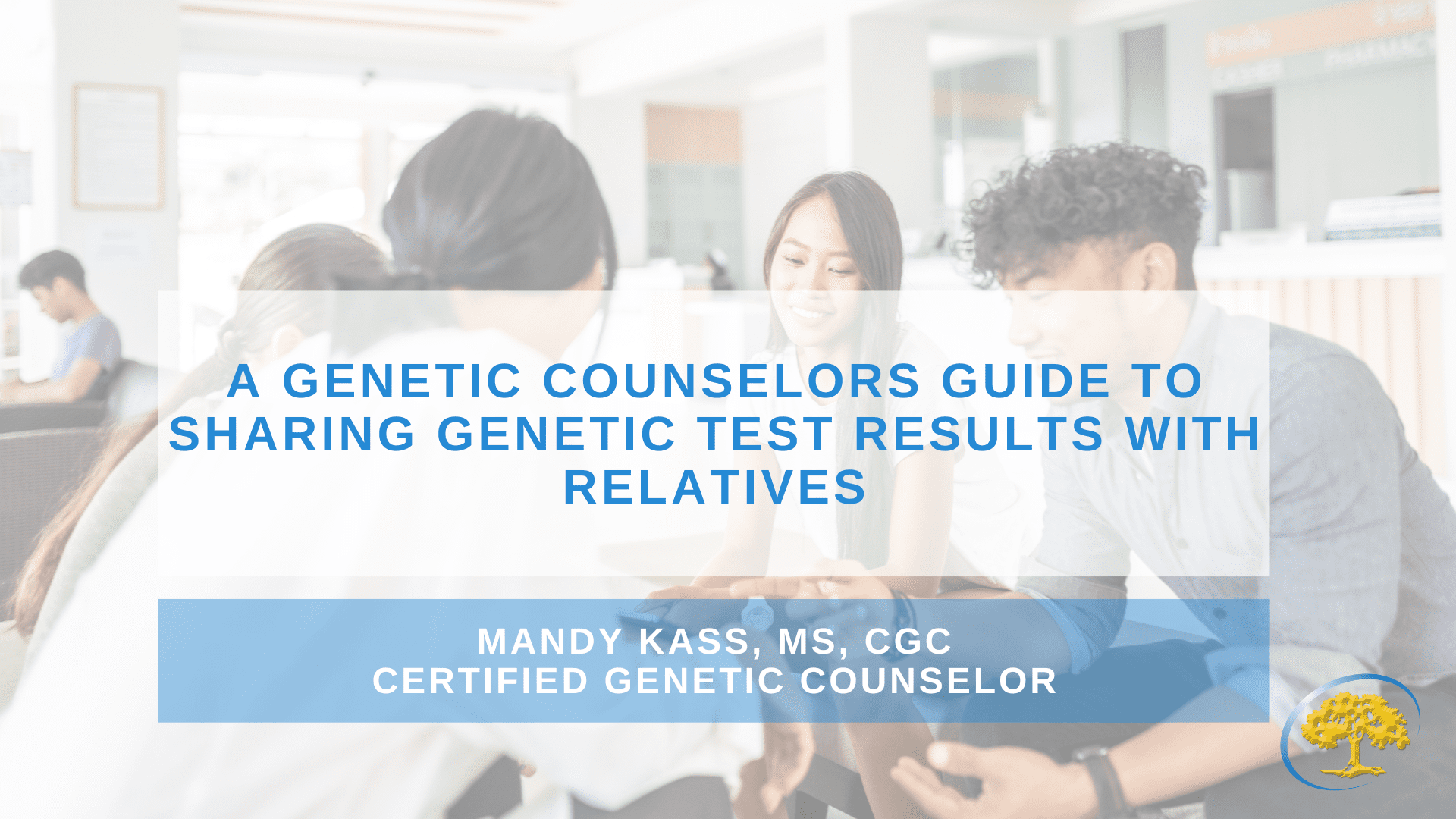
Posted 1 year ago
A Genetic Counselors Guide to Sharing Genetic Test Results with Relatives
If you have had genetic testing and been diagnosed with a hereditary predisposition to cancer, you may be in a position to provide your relatives with information they can use to understand and manage their own risk for cancer. Most people who have an inherited predisposition to cancer are unaware they have it. For this reason, it is important for people who are aware of an inherited predisposition in themselves or in the family to share this information with their biological relatives. Contacting all your relatives may seem like a daunting task, but there are steps you can take to help you feel more equipped with communicating the information.
Why should you share?
– Inherited gene mutations affect men and women across multiple generations within families.
– Biological relatives, even distant relatives, may share the same mutation that runs in the family.
– Your relatives may not be aware of the family’s medical history.
– Your relatives may not be aware that genetic testing for a hereditary risk for cancer is an option.
– Having this information allows your relatives to make proactive and preventative choices regarding their own healthcare.
What should you share?
Sharing your medical records is a personal decision and not everyone is comfortable sharing their health information. If you are open to sharing, there are certain parts of your health history that may be helpful to your relatives.
– Your cancer type – Certain cancer types are more likely to be hereditary than others. Sharing your specific cancer type and the age that you were diagnosed can help your relatives and their providers determine appropriate testing and screening strategies.
– The type of genetic test you had – There are many types of genetic tests. Knowing the name of the test and laboratory that performed your testing can help your relative’s providers understand what genes were tested.
– Your genetic test results and report – Having access to a copy of your genetic test report and sharing it with relatives is the most important piece of information you can share. This allows your relative’s providers to order the correct test and/or make appropriate management recommendations.
Who to contact?
If you tested positive for an inherited risk for cancer, in most cases, it was inherited from your mother or father. Knowing which side of the family your mutation came from allows you to focus your efforts on informing relatives on that side of the family. However, if you are unsure which side of the family the mutation is coming from, and your parents are unable to be tested, you may need to inform relatives on both sides of the family. Working with a genetic counselor will allow you to determine any patterns within the family that may suggest which side of the family the inherited risk is coming from, which may help narrow down your list of family members to contact.
Working with a genetic counselor who can draw your family tree can also help identify which relatives to tell first. Family members that share a closer relation, such as siblings, parents, and children are generally a good place to start. If a relative tests negative for the mutation, their children will not need to pursue testing for that mutation. For example, if your brother tests negative for a known familial gene mutation, his children (your nieces and nephews) will not carry this mutation. They could still develop cancer, but their risk for cancer may be the same as someone who does not have an inherited risk for cancer. Some family members who are particularly close to you or more up-to-date on the family may be willing and able to help you locate and share this information with your extended family.
How to share this information with relatives:
How you notify relatives about your genetic test results is up to you. Some use the same approach for all their relatives, while others may tailor their conversation for each individual relative. Some approaches to consider include:
– For relatives that you are close with, meeting in-person to share this information may allow for support and reassurance. Family reunions and holiday gatherings may be an opportunity to gather updated contact information for relatives.
– Some people may be uncomfortable with emotional in person or video meetings. Writing a brief letter to your family members with information about your genetic test results and your personal history of cancer may be a good option in this case. This same letter can be sent to all relatives either in the mail or by email. Including a copy of your genetic test result with this letter is very helpful.
– Family dynamics are unique and it is normal for relatives to lose contact over the years. Some find it useful to connect with relatives over social media and start the conversation from there.
– For many, it can be overwhelming to contact every relative individually. Maybe you have a large family or you are currently going through cancer treatment yourself. This is a good time to lean on any supportive family members that may be able to assist with disseminating this information to relatives.
If you are on the fence about sharing your genetic test result, or maybe feel as though it is a burden to your relatives to share this information, remember that keeping the information from them will not change their risk for cancer and may limit their options for early detection or prevention. There may be valid reasons to delay sharing these results with relatives until the time is right, however, although there is no perfect time to learn about an inherited risk for cancer, there is also no perfect time to be diagnosed with cancer. Genetic counselors are available to support you and your family throughout this process.
Mandy Kass, MS, CGC

The ultimate goal of cancer genetic counseling is to empower patients to use their personal risk information to better inform treatment and management decisions and to educate family members on their possible cancer risks.
Mandy obtained her Bachelor of Science degree in Psychology from Arizona State University in 2013. She then went on to pursue her Master’s Degree in Human Genetics from Sarah Lawrence College and graduated in 2016. Her training in genetic counseling included clinical rotations at several locations throughout New York City, including Columbia University Medical Center, Mount Sinai Beth Israel, and Bellevue Hospital.
Prior to pursuing her graduate degree, Mandy worked for the National Suicide Prevention Lifeline. She is also a member of the National Society of Genetic Counselors and of the Cancer Special Interest Group. Outside of work, Mandy enjoys exploring Arizona, traveling, and spending time with her family, friends, and two golden retrievers.
She is happy to be part of Ironwood Cancer & Research Centers and to manage a genetic counseling department based on individualized care, patient education, and supportive guidance.
Please ask your Ironwood Cancer & Research Centers doctor for a referral to see our genetic counselor.
